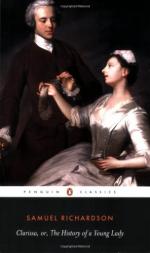Here, Jack, I laid out for a compliment, and missed it.
’Tis easy to guess, Sir; for there cannot be two such gentlemen as you.
Well said, dame Smith—but mean you good or bad?—Handsome was the least I thought she would have said.
I leave you to guess, Sir.
Condemned, thought I, by myself, on this appeal.
Why, father Smith, thy wife is a wit, man!—Didst thou ever find that out before?—But where is widow Lovick, dame Smith? My cousin John Belford says she is a very good woman. Is she within? or is she gone with Miss Harlowe too?
She will be within by-and-by, Sir. She is not with the lady.
Well, but my good dear Mrs. Smith, where is the lady gone? and when will she return?
I can’t tell, Sir.
Don’t tell fibs, dame Smith; don’t tell fibs, chucking her under the chin: which made John’s upper-lip, with chin shortened, rise to his nose. —I am sure you know!—But here’s another pair of stairs: let us see: Who lives up there?—but hold, here’s another room locked up, tapping at the door—Who’s at home? cried I.
That’s Mrs. Lovick’s apartment. She is gone out, and has the key with her.
Widow Lovick! rapping again, I believe you are at home: pray open the door.
John and Joseph muttered and whispered together.
No whispering, honest friends: ’tis not manners to whisper. Joseph, what said John to thee?
John! Sir, disdainfully repeated the good woman.
I beg pardon, Mrs. Smith: but you see the force of example. Had you showed your honest man more respect, I should. Let me give you a piece of advice—women who treat their husbands irreverently, teach strangers to use them with contempt. There, honest master John; why dost not pull off thy hat to me?—Oh! so thou wouldst, if thou hadst it on: but thou never wearest thy hat in thy wife’s presence, I believe; dost thou?
None of your fleers and your jeers, Sir, cried John. I wish every married pair lived as happily as we do.
I wish so too, honest friend. But I’ll be hanged if thou hast any children.
Why so, Sir?
Hast thou?—Answer me, man: Hast thou, or not?
Perhaps not, Sir. But what of that?
What of that?—Why I’ll tell thee: The man who has no children by his wife must put up with plain John. Hadst thou a child or two, thou’dst be called Mr. Smith, with a courtesy, or a smile at least, at every word.
You are very pleasant, Sir, replied my dame. I fancy, if either my husband or I had as much to answer for as I know whom, we should not be so merry.
Why then, dame Smith, so much the worse for those who were obliged to keep you company. But I am not merry—I am sad!—Hey-ho!—Where shall I find my dear Miss Harlowe?
My beloved Miss Harlowe! [calling at the foot of the third pair of stairs,] if you are above, for Heaven’s sake answer me. I am coming up.




